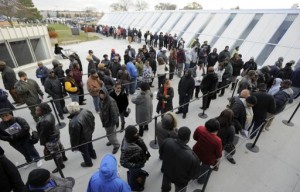For those of us who opposed the re-election of the President precisely for his announced effort “to transform” America into something tradition had never favored, there has been an even deeper and troubling election result.
Most of the post-election blather has been just that. Exit-polling has always been extremely unreliable and much pseudo-intellectualized and often fact-free pontificating has been based on it. [Republicans, conservatives, and ”private persons” — including yours truly — notoriously refuse to talk to the young lady with the clipboard as they rush home from the polling booth.]

What passes for “analysis” is more often than not either apologia for wrong predictions or justifications for slogans which may or may not have had anything to do with Mr. Obama’s victory. Long after all this post-election hysteria has died away, historians will see another set of facts. Nevertheless, buoyed by a cloying media, conventional liberal orthodoxy has already enshrined some post-election clichés, as false as much of their pre-election propaganda.
No, Virginia, it was not decided by the rising tide of Democratic captured minorities. [Texas has just elected an outstanding slate of Spanish-speaking Republican officeholders at both the state and federal level and there are two GOP governors with Hispanic names.]
No, it was not charisma of the Democratic candidate. [Barack Obama’s adulation wore thin in 2012 even among his acolytes.]
No, it was not Republican obstructionism of the President’s program in the Congress. [All prominent House Republicans retained their seats, their loss may not be more than a half dozen seats with a continuing Republican lock. In the Senate, despite their five-seat loss, conservative Democrats will continue to flirt with Republicans in opposition to Mr. Obama’s economic program. That’s why Majority Leader Harry Reid has not produced a budget in three and a half years and why the President’s latest proffer was rejected 90 to 0.]
No, it was not Gov. Romney’s poisonous personality. [He played out his role as Big Daddy as well as such a strategy demanded although tactically he might have erred by being “decent”.]
No, the sad news is despite all the promise of increasingly defined, diametrically opposed approaches to the nation’s problems, the apposition resulted in little real discussion. Despite, again, defying the shibboleth debates are meaningless; coming close to a real exchange of ideas in the second debate was sabotaged by the muddled and prejudicial fifthwheel moderators.
The President never presented a program, and Gov. Romney, hoping to finesse victory, did not lay out “solutions” requiring extensive negotiation if he had won. Shattering another of those mantras by the talking heads, there was no great contest for the undecided, independents, etc. It was from start to finish a fight to mobilize the bases.
And that, it seems to this writer, is where the bad news begins. It was a contest of process not of ideas. The Obama camp won because they never abandoned their 2008 campaign structure, but instead bore down on its data bases all during the First Administration. The President threw his following a bone once in a while avoiding exposing himself to the pitfalls of leadership thus keeping his campaign apparatus intact. Impoverished intellectually and behind the time curve because of energy expended in the Republican primaries, the Governor’s machine was never a match. The very fact the President had three times the regional command posts was the giveaway.
Sadly, again I say in a very subjective way, the Obama campaign was able to, painstakingly identify its voters, and march them to the polls. There were loyalties, of course — some youthful new voters who live off late-night shows saw a President for the first time talking their rather meaningless gabble. African-Americans, further impoverished by his very economic policies, nevertheless trooped out in tribal loyalty in crucial areas such as Tidewater Virginia to join their strange comrades in arms, the pampered government bureaucrats living across the river in northern Virginia.
But, mainly, although it could not produce the enthusiasm of the 2008 crusade, a new kind of political machine powered by the digital revolution replaced the almost forgotten old door-to-door visitations and turkey-on-Thanksgiving tactics of former big city machines.
It cannot but be a sad commentary on the American political process. Data banks have replaced ward heelers.
Sol W. Sanders, (solsanders@cox.net), writes the ‘Follow the Money’ column for The Washington Times on the convergence of international politics, business and economics. He is also a contributing editor for WorldTribune.com and East-Asia-Intel.com.

